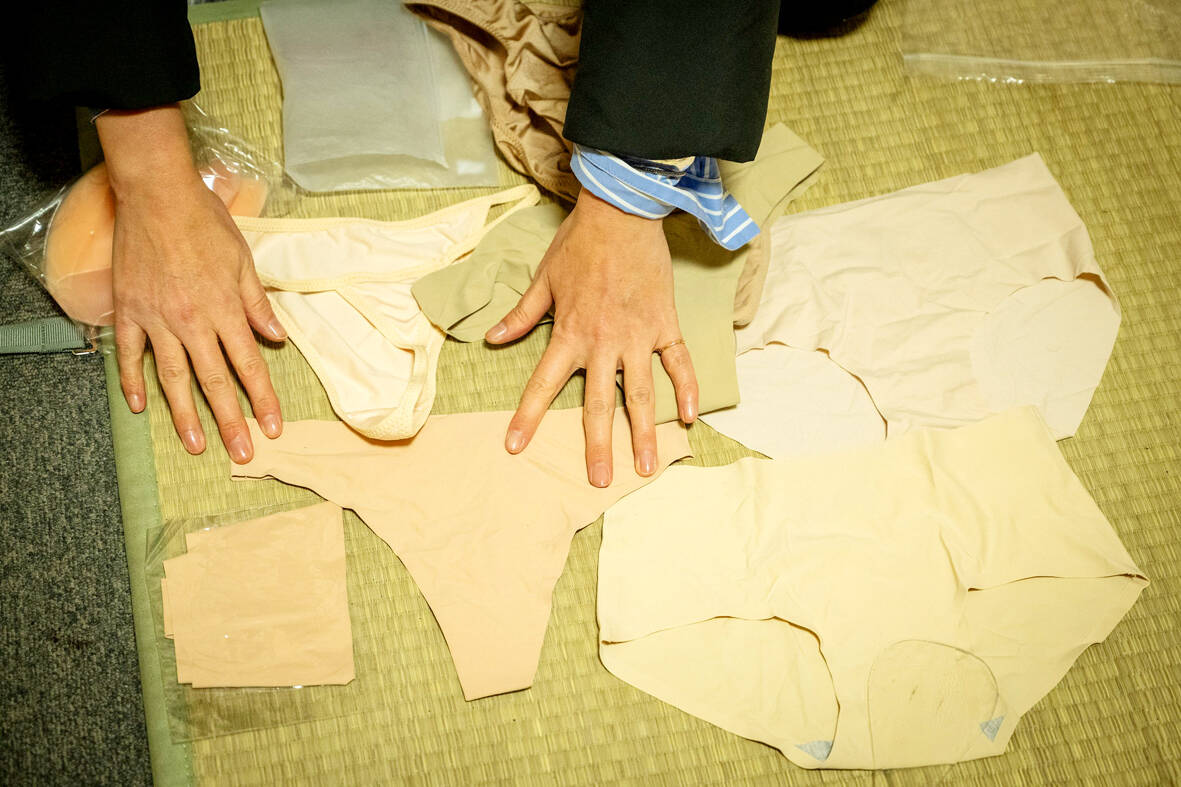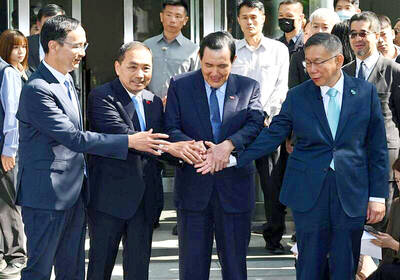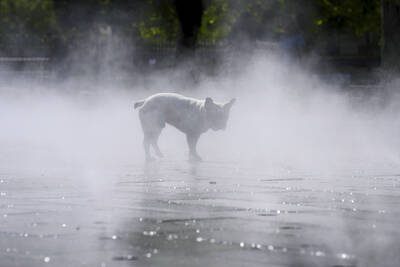On a set outside Tokyo, Momoko Nishiyama sits with the drama’s director and watches as a man undresses a woman, guiding the love scene as one of just two “intimacy coordinators” in Japan.
The country’s film and television industry has been hit by a string of recent sexual abuse allegations that have led to apologies and movies being pulled.
But while Hollywood has embraced intimacy coordinators in the wake of the #MeToo movement, they are still relatively new in Japan, where public reaction to the latest scandals has been muted.

Photo: AFP
“In the United States, everyone knows what an intimacy coordinator is, but in Japan, I have to start by explaining what it is that I do, and that I’m not the director’s enemy,” Nishiyama said.
The 43-year-old’s recent projects include a TV series with multiple intimate scenes.
On set, she confers with the director and observes actors, advising them how to move and adjusting their outfits. But her work starts well before anyone shouts “action,” beginning with a close read of the script.

Photo: AFP
“I say to the director: ‘Here it says A embraces B, will it go further than that?’ or ‘What clothes will the actors be wearing? How undressed will they get?’” Nishiyama explained.
She then meets privately with each actor to determine their boundaries.
“This is a scene without a bra. If we don’t show your chest, are you okay with it?” is one question she might ask. For 23-year-old actress Asuka Kawazu, Nishiyama offers reassurance.

Photo: AFP
“Her presence made discussions easier,” she said.
Without an intimacy coordinator, “a case could arise where we agree on something, but then when shooting we realize we’re going much further than we had planned,” she said.
LACK OF SOLIDARITY
Despite several high-profile allegations, the #MeToo movement was less pervasive in Japan than in some other developed countries.
But Nishiyama has seen demand for her services increase after multiple accusations of sexual harassment and abuse in her industry.
Some of the allegations prompted a group of directors including celebrated auteur Hirokazu Kore-eda to call for change, but the reaction from other professionals in the field was more subdued.
Miwa Nishikawa, who is part of the group, said the directors “were shocked” both by the accusations and the industry’s inaction.
“Unlike in the West or South Korea where the #MeToo movement took hold, the Japanese industry wasn’t able to change,” she said. “I think it shows a lack of solidarity between workers in the industry, where there is no organization to unite and protect them.”
The group hoped its statement “would make it easier for people to speak out,” Nishikawa added.
The directors back the use of intimacy coordinators, though Nishikawa cautions that won’t be enough to end abuse off-set.
Still, their presence shows that “the safety and dignity of actors and staff” are more protected.
“That can create an atmosphere that discourages harassment.”
She and her fellow directors also want sensitivity training and industry guidelines for casting and shooting, warning that otherwise “incidents and accidents” will keep happening.
MODESTY GARMENTS
On set in Tokyo, director Kenji Kuwashima is happy having Nishiyama there, and sees her as “defending both parties.”
“In the end, everyone wants the same thing: to make the best production possible,” he said.
“Until now, relations were much more top-down, with the director saying ‘do this,’ but it’s become more equal and both sides benefit.”
When preparing to go on set, Nishiyama gathers props that help keep scenes realistic while protecting actors.
She’s never without a range of silicone patches that prevent contact between intimate parts of the body, as well as maebari — a made-to-measure modesty garment.
From a bag she pulls out a collection of underwear ranging from panties to thongs in different skin tone shades.
“I’ve always got about 30 with me,” she said, laughing.
Nishiyama started her career as a production coordinator, mainly for Japanese shoots abroad, and took up her current role after an intensive online US training course.
The rising demand for her services suggests “things are changing, little by little,” she said.
But she admits feeling “a little powerless” to hear that some industry players accused of abuse have continued to work unchallenged.
“There are people who want to change things, and there are more and more film sets with a healthy atmosphere. But I think that things must change more.”

Has the Taiwan People’s Party (TPP) changed under the leadership of Huang Kuo-chang (黃國昌)? In tone and messaging, it obviously has, but this is largely driven by events over the past year. How much is surface noise, and how much is substance? How differently party founder Ko Wen-je (柯文哲) would have handled these events is impossible to determine because the biggest event was Ko’s own arrest on multiple corruption charges and being jailed incommunicado. To understand the similarities and differences that may be evolving in the Huang era, we must first understand Ko’s TPP. ELECTORAL STRATEGY The party’s strategy under Ko was

It’s Aug. 8, Father’s Day in Taiwan. I asked a Chinese chatbot a simple question: “How is Father’s Day celebrated in Taiwan and China?” The answer was as ideological as it was unexpected. The AI said Taiwan is “a region” (地區) and “a province of China” (中國的省份). It then adopted the collective pronoun “we” to praise the holiday in the voice of the “Chinese government,” saying Father’s Day aligns with “core socialist values” of the “Chinese nation.” The chatbot was DeepSeek, the fastest growing app ever to reach 100 million users (in seven days!) and one of the world’s most advanced and

It turns out many Americans aren’t great at identifying which personal decisions contribute most to climate change. A study recently published by the National Academy of Sciences found that when asked to rank actions, such as swapping a car that uses gasoline for an electric one, carpooling or reducing food waste, participants weren’t very accurate when assessing how much those actions contributed to climate change, which is caused mostly by the release of greenhouse gases that happen when fuels like gasoline, oil and coal are burned. “People over-assign impact to actually pretty low-impact actions such as recycling, and underestimate the actual carbon

An internal Meta Platforms document detailing policies on chatbot behavior has permitted the company’s artificial intelligence creations to “engage a child in conversations that are romantic or sensual,” generate false medical information and help users argue that Black people are “dumber than white people.” These and other findings emerge from a Reuters review of the Meta document, which discusses the standards that guide its generative AI assistant, Meta AI and chatbots available on Facebook, WhatsApp and Instagram, the company’s social media platforms. Meta confirmed the document’s authenticity, but said that after receiving questions earlier this month, the company removed portions which stated